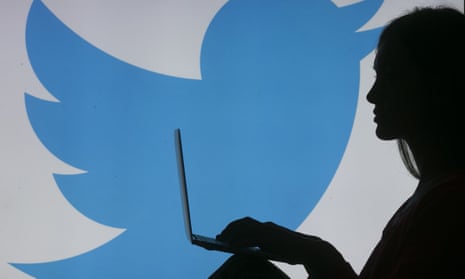Twitter has admitted that more than 50,000 Russia-linked accounts used its service to post automated material about the 2016 US election – a far greater number than previously disclosed.
Announcing the discovery in a post to its website late on Friday, the company said the posts had reached at least 677,775 Americans, all of whom would be receiving a warning by email.
Twitter said it had removed the 50,258 accounts linked to Russia and turned over details to congressional investigators who are looking into Moscow’s interference with the US election campaign.
The company stressed that the Russian accounts represented a small proportion of the total number using its service. “However any such activity represents a challenge to democratic societies everywhere, and we’re committed to continuing to work on this important issue,” it said.
Q&AWhat is a Twitter bot?
Show
Strictly defined, a Twitter bot is any automated account on the social network. That can be something as simple as automatically tweeting links to news articles – most of the Guardian's social media accounts are technically Twitter bots, for instance – to complex interactions like automatically generating Emoji-based art or automatically replying to climate change deniers with scientific evidence.
But, as with "troll" and "fake news", the strict definition has been forgotten as the term has become one of political conflict. The core of the debate is the accusation that a number of political tweets were sent by "Russian bots", with the intention of subverting political debate, or simply creating chaos generally.
Based on what we know about Russian information warfare, the Twitter accounts run by the country's "troll army", based in a nondescript office building in St Petersburg, are unlikely to be automated at all. Instead, accounts like @SouthLoneStar, which pretended to be a Texan right-winger, were probably run by individuals paid 45-65,000 rubles a month to sow discord in Western politics.
In other ways, they resembled bots – hence the confusion. They rarely tweeted about themselves, sent far more posts than a typical user, and were single-minded in what they shared. People behaving like bots pretending to be people: this is the nature of modern propaganda.
Twitter and Facebook have been sharply criticised by US lawmakers and others for failing to prevent a torrent of propaganda and disinformation about American politics being posted to their networks during the contentious 2016 campaign.
US intelligence authorities have concluded that Russia’s government mounted an assault on the US election campaign across several fronts including social media, with the intention of aiding Donald Trump and harming Clinton, his Democratic opponent.
Twitter said on Friday that more than 3,800 accounts had been traced back to Russian state operatives. It gave examples of their tweets, which included an attack on Hillary Clinton’s performance in a presidential debate.
Posts by one Russian state propaganda account were retweeted by senior advisers to Trump, including his son Donald Jr and Kellyanne Conway, who is now a senior aide to the president in the White House.
The company’s update on Friday was only the latest in a series of upward revisions to the estimated scale of exploitation of its platform by Russian state entities and automated accounts, or “bots”, whose origins are less clear.
Twitter previously told Congress last October that it had discovered 36,746 Russian accounts that posted automated material about the US election, and that Russian state operatives were behind at least 2,752. This figure was ten times greater than the 201 state-backed accounts identified by the company the previous month.
At that time, a senior company executive gave testimony to the Senate intelligence committee that was described by Mark Warner, the committee’s senior Democrat, as “frankly inadequate on almost every level”.
Facebook, meanwhile, has estimated that as many as 126 million Americans had been exposed to Russian-backed material on its platform during the 2016 election campaign.
In the new announcement on Friday, Twitter said it had now identified a total of 3,814 state operative accounts connected to the Internet Research Agency (IRA), a “troll farm” backed by the Russian government. Twitter said these IRA accounts posted 175,993 tweets during the election period, and 8.4% of these were election-related.
The company said that it would take the unusual step of emailing all people in the US who had followed one of the Russian accounts or retweeted or liked any tweet posted by them during the election campaign period.
